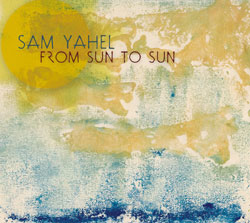MUSIC REVIEW BY Stuart Kremsky, Cadence
After five albums on which he played only organ, Sam Yahel moved over to the piano bench for his last release on Origin, and he largely stays there for this new session. Yahel, joined once again by accomplished bassist Matt Penman and the ever tasteful drummer Jochen Rueckert, is insidiously charming on the free-flowing "2 Pilgrims" that opens the set. It's the first of ten original compositions by the keyboardist, whose caressing touch at the piano is one of the disc's consistent pleasures. As a composer, he's mostly interested in various ways of swinging in the interactive setting of the trio. The music is not nearly as engaging when he gets away from that, as on "After the Storm," an atmospheric piano and organ duet that seems out of place. "Saba" gets the band back to its strengths with a brightly riffing bass, bouncy drums and a bluesy melody. The first of three standards, "A Beautiful Friendship," is usually performed by vocalists, and Yahel sets it at a gently loping tempo that brings out the loveliness of the melodic line and his own embellishments. Rueckert sounds very good on brushes backing the piano solo, curiously switching to sticks for Penman's busy solo - and it works! "One False Move" charges right ahead, with Rueckert laying down a quick beat for Penman and Yahel to juggle melodic shards back and forth in a tightly focused and entirely successful performance. The title track is nearly hummable, a happy melody that's perfect for ending a set and leaving the audience smiling. Yahel sneaks in a little organ on this one. Note that we're only at the halfway mark of this generously timed disc, and so there's more to engage the mind and the feet, including the other non-originals, Cole Porter's "So In Love" and a free-wheeling version of Vernon Duke's "Taking a Chance On Love." "Blink and Move On" is another piano and organ duet that meanders along for a couple of minutes before it's back to business for "Toy Balloon," which starts out calmly before opening up into a slightly up tempo. The two piano and organ pieces and the classically-oriented piano solo "Prelude" show Yahel moving in other, less interesting directions, mainly acting to break up the flow of the disc. All three could have been left off the finished product and it would have been an even stronger album than it is. The organ's loss is the piano's gain, and Yahel's trio music is well worth hearing by fans of modern jazz piano.
Soundclips
Other Reviews of
"From Sun to Sun":
Downbeat Magzine by John Ephland
The Jazz Word by John Barron
Audiophile Audition by Doug Simpson
New York Times by Nate Chinen
All About Jazz by Dan McClenaghan
All About Jazz by Dan Bilawsky
All Music Guide by Alex Henderson
